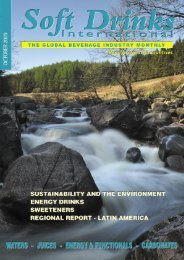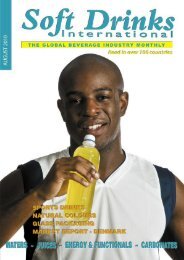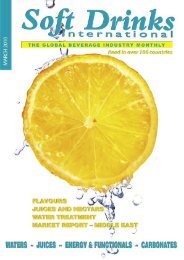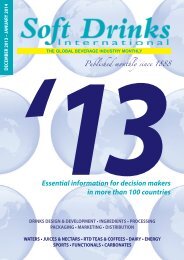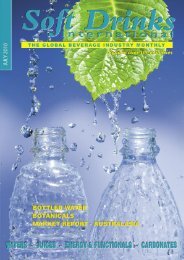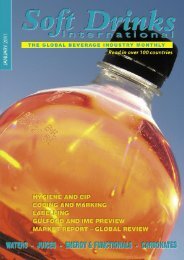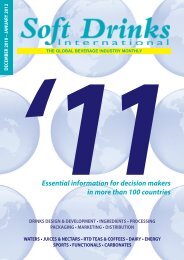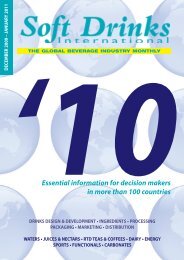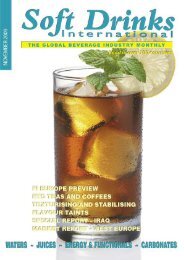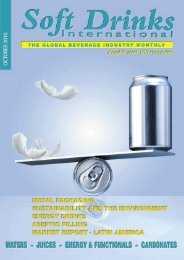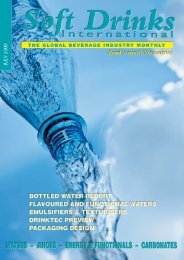Palatinose - Soft Drinks International
Palatinose - Soft Drinks International
Palatinose - Soft Drinks International
You also want an ePaper? Increase the reach of your titles
YUMPU automatically turns print PDFs into web optimized ePapers that Google loves.
42 GREEN ISSUES<br />
<strong>Soft</strong> <strong>Drinks</strong> <strong>International</strong> – February 2011<br />
Environment<br />
Third Clean-up Day<br />
PROVEN a success over the past two years,<br />
the Masafi Clean-Up Day returned to Masafi<br />
Village in 2011 for a third time, its ongoing<br />
effectiveness ensuring that it will be an<br />
annual tradition.<br />
Masafi, one of the Middle East’s biggest<br />
producers of packaged water as well as an<br />
increasingly significant player in the juice sector<br />
and a manufacturer of other FMCG<br />
lines, is very active in sustainability and environmental<br />
protection. It runs a unique corporate<br />
recycling service in the UAE, has<br />
adopted a Carbon Action Plan to reduce its<br />
carbon emissions and uses environmentally<br />
optimised packaging.<br />
The Clean-Up Day is a little different in<br />
that it focuses on the company’s ‘home<br />
town’ in the emirate of Ras Al Khaimah.<br />
Masafi mobilises its staff to remove waste<br />
from throughout the town, at the same time<br />
US green<br />
packaging set<br />
to rise<br />
DEMAND for green packaging in the US –<br />
comprised of recycled content, reusable and<br />
degradable packaging – is projected to<br />
increase 3.9% yearly to US$41.7 billion in<br />
2014, consuming 58 billion pounds of material.<br />
Growth will outpace overall packaging<br />
demand but will remain relatively moderate<br />
due to the maturity of many products and<br />
the large existing presence of recycled-content<br />
packaging in paperboard and metal<br />
packaging. The fastest gains are anticipated<br />
for degradable packaging and plastic recycled<br />
content packaging.<br />
These and other trends are presented in<br />
'Green Packaging' a new study from The<br />
Freedonia Group Inc, a Cleveland-based<br />
industry market research firm.<br />
Degradable packaging is forecast to<br />
expand 13.6% annually to US$685 million in<br />
2014, driven by price competitiveness with<br />
conventional resins, capacity expansions and<br />
rising demand for environmentally friendly<br />
manufactured goods. Advances will also be<br />
based on enhanced performance properties<br />
resulting from blending and other modifications,<br />
initiatives by brand owners to improve<br />
the environmental footprint of their packaging.<br />
Preventing faster advances will be the<br />
maturity of some product types, the lack of<br />
consumer composting networks in most<br />
areas of the US, and competition from<br />
emerging green packaging materials such as<br />
non-biodegradable bioplastics.<br />
Masafi Clean-Up Day.<br />
educating local residents to follow recycle,<br />
reuse and reduce habits. This year, 243 staff<br />
collected over nine metric tonnes of waste<br />
in about three hours.<br />
“As a company, we are committed to the<br />
Plastic bottle<br />
recycling up<br />
THE latest report commissioned by Recoup<br />
and sponsored by Nampak Plastics and PPS<br />
Recovery Systems shows an encouraging<br />
increase in the UK's bottle recycling rate<br />
with 46% of plastic bottles now being collected<br />
for recycling.<br />
The revised and finalised data now suggest<br />
a 7% increase in comparison with last<br />
year’s report. Approximately 303,000 tonnes<br />
of plastic packaging was collected from<br />
bring and kerbside schemes for recycling in<br />
2009. From this total, 263,000 tonnes was<br />
reported as plastic bottles.<br />
To put it in perspective, if all the plastic<br />
bottles collected in the UK for recycling in<br />
Recycled-content packaging constitutes<br />
the vast majority of green packaging and<br />
demand is forecast to increase 3.6% annually<br />
to US$37.3 billion in 2014. Gains will be<br />
supported by increased collection activity<br />
and processing capacity, coupled with greater<br />
use of recycled-content packaging by firms<br />
seeking to demonstrate environmental<br />
responsibility and differentiate their products.<br />
Robust growth is anticipated for plastic recycled-content<br />
packaging based on more concerted<br />
collection efforts and expanded<br />
processing capacity.<br />
Reusable packaging demand is expected<br />
to post above-average growth through 2014,<br />
improving from the 2004-2009 pace based<br />
on a rebound in manufacturing activity from<br />
a weak base in 2009.<br />
cause of a sustainable tomorrow and our<br />
efforts are aimed at changing attitudes and<br />
behaviour for a cleaner environment,” said<br />
Natascha Edelmann, Masafi’s Head of Marketing.<br />
2009 were laid end to end, they would<br />
reach the moon and back two times.<br />
The majority (82%) of local authorities<br />
that responded when asked how the plastic<br />
bottle collection scheme was working, indicated<br />
that their schemes were running<br />
smoothly. This suggests that the infrastructure<br />
and support required to launch and<br />
sustainably operate a plastic bottle collection<br />
scheme is now available to most UK<br />
local authorities.<br />
When asked to indicate the reasons and<br />
factors which prevented them from introducing<br />
plastic bottles into kerbside collection<br />
schemes, the most common reasons<br />
given were the ‘cost implications for changing<br />
existing schemes to accommodate the<br />
collection of plastic bottles’ and ‘the difficulties<br />
of adding plastics due to the lack of<br />
compartments available in the kerbside<br />
sorting vehicle’.<br />
According to the data, over 54% of plastic<br />
bottles are still not recycled. Aside from<br />
the issues around reducing landfill reliance<br />
and needing to meet increasing recycling<br />
targets, there is genuine concern that without<br />
a focused effort, the plastic bottle<br />
reprocessing infrastructure in the UK cannot<br />
be sustainably supported by UK bottle collections.<br />
The survey responses suggest that kerbside<br />
schemes could potentially recover<br />
271,000 tonnes of plastic bottles in 2012,<br />
representing 56,000 additional tonnes. If a<br />
yearly 10% increase in household kerbside<br />
coverage and also performance was applied,<br />
the estimated collection could reach over<br />
350,000 tonnes.<br />
The full report is available free from the<br />
Recoup website at: www.recoup.org .



